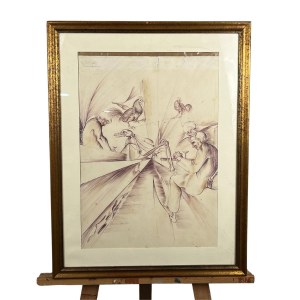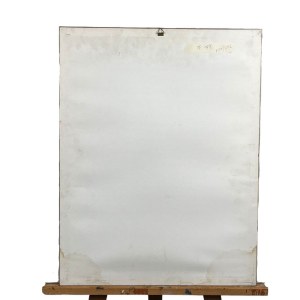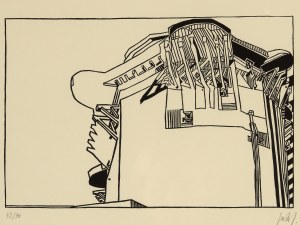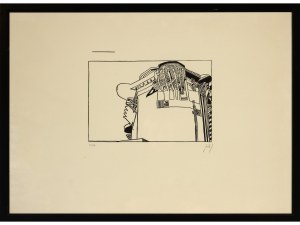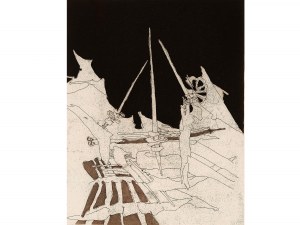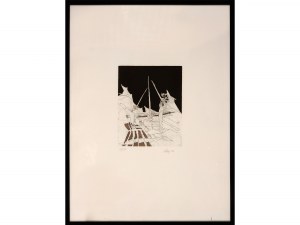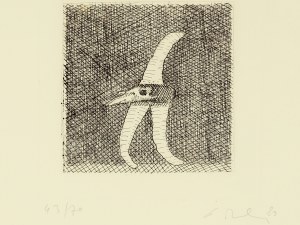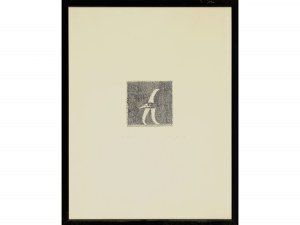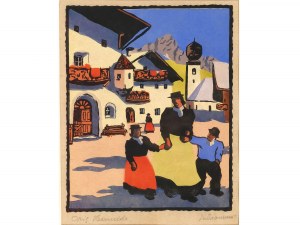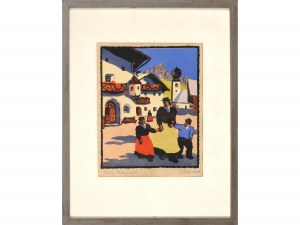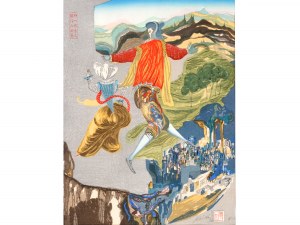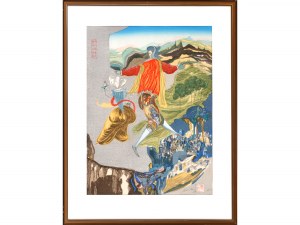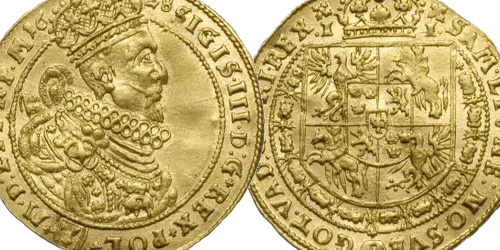Stanislaw Ignacy Witkiewicz (1885-1939) - 2 postcards [hand-drawn by the artist]
Card dimensions: 10.5 x 14.8 cm.
The first card - is addressed to Alice Liphardt (1909-1973) and written in two handwriting characters. The postcard is described and reproduced in the second volume (vol. 1) of Stanislaw Ignacy Witkiewicz's "Letters" [compiled by Tomasz Pawlak], published by the State Publishing Institute in 2014.
Authors of the texts and drawings.
The author of the text on the left side of the card along with the drawing is Stanislaw Ignacy Witkiewicz - Witkacy (1885-1939). The text and drawing are made in blue crayon.
The drawing shows a mustachioed man along with a group of smiling elongated figures with curly hair. On the right side it is accompanied by a signature completed with abbreviations, known from portraits by Witkacy, made as part of the "S.I. Witkiewicz" Portrait Company:
"NΠ5m + P (ost) / + Cof. Witkacy/ 1928 XI"
Which means: didn't drink 5 months + smoked a cigarette (the last one) + caffeine (probably it's about coffee).
Below is the text in French and Polish: "un homme sain sur le fond de feminite impersonnelle et permamente" (translated as "a healthy man against the background of impersonal and permanent femininity"). At the very bottom of the text in the hand of S. I. Witkiewicz: "Late wishes for the Feast of Saints are sent by Witkacy".
The author of the text on the right side of the card (separated from Witkacy's text by a vertical line) is Roman Jasinski (1900-1987), Witkacy's Warsaw friend, pianist and music critic. He collaborated with "Wiadomości Literackie", "Gazeta Polska " and "Pion". In 1926-39 he worked in the music department of Polish Radio, and after the war he was editor-in-chief there and hosted the program "Musical Varieties." He is one of the actors (along with the addressee of the card under discussion) in films made by August Zamoyski recently discovered in his archive. He was the author of some of the most interesting post-war memoirs about Witkacy (R. Jasieński, Witkacy [in:] Stanisław Ignacy Witkiewicz człowiek i twórca.... Warsaw 1957, pp. 307-314 and: From the album of Roman Jasieński , On Witkacy. Interviewed by R. Jarocki "Literatura" 1985, no. 3, pp. 2-9.)
The text written in pen was accompanied by drawings of hands holding flowers:
"Today we are celebrating with Witkacy in a / solemn manner the wilja Niep . 10 anniversary of the Niep. Pan. Polsk. / Dressed in National costumes, with lanterns / in hand we move in a moment to the outskirts to / take an active part in the joy of the common people. / Greetings / RJasinski / from the last !!moment !!! / P.S. / May you imagine that Staś / selected for company still on the 3rd Roman Ronikier !!!!"
The text on the address page of the card is probably also by Roman Jasinski. The sender's address: "Comte Witkacy / Warsaw / Bracka 23" [this is Witkacy's Warsaw address where his wife Jadwiga lived permanently].
Address of the addressee of the card: "Mrs Alice Liphardt / Berlin / Wilmersdorf / 14. Günzelstrasse / bei Fr. v. Massenbach".
Persons mentioned in the text:
The addressee of the card is Alice Liphardt (1909-1973). Primo voto Romaszkan, 2voto de Barcza - illustrator, fashion designer and writer. Daughter of German industrialist Otto and Elisabeth Vitali (known as the chocolate baroness because she ran the Wedel store on Szpitalna Street in Warsaw). She was friends with poets Skamander and Witold Gombrowicz, Jan Lechoń and Kazimierz Wierzyński. Lechoń wrote of her: "Litka once fascinated by the boyish beauty of a girl from Warsaw." With her husband Jerzy Romaszkan she settled in 1931 in the Hutsul region, during the war they made their way to Hungary. After her husband's death, she married Hungarian Count Charles de Barcz. In 1948, she published a novel under a pseudonym in Switzerland about life in Hungary under Soviet occupation. The book was also published in the US (Comes the Comrade. Translated from the Polish by M.A. Michael and L. Meyer, New York 1950) became a bestseller. After this success, she moved with her husband to the United States, where she published three more novels. She helped Gombrowicz abroad After her archive was destroyed by a flood, she returned to Poland in the 1970s.
Together with Jasinski and Witkacy, she appeared, in the aforementioned films by August Zamoyski.
Bogdan Ronikier, mentioned by Jasinski, is Bogdan Jaxa-Ronikier (1872-1956). A playwright (he wrote more than a dozen plays), prose writer (author of four novels) and poet. In 1933 he published a fictionalized biography of Feliks Dzerzhinsky, The Red Executioner, which became a major literary success. He was a colorful figure of Warsaw. Born into a wealthy landowning family, he studied in Dresden, Berlin, Leipzig and Munich, among other places, where he graduated in mathematics and philosophy. In 1911 he was accused of the murder of his brother-in-law and after a notorious trial was sentenced to 11 years of hard labor and life exile to Siberia. He managed to avoid deportation due to the outbreak of war and sat in a Warsaw prison until 1918 (see Prison Walls. Memoirs of B. hr. Ronikier. Preceded by an introduction by St.A. Wołowski, Warsaw 1927). His interesting wartime and prison life is described by S. Szenic, Pitaval warszawski, W-a 1958, vol. II, part II, p. 26.
Witkacy met Ronikier in January 1927 and painted his portrait - see Stanisław Ignacy Witkiewicz 1855-1939 Katalog dzieł malarskich. Compiled by Irena Jakimowicz with the cooperation of Anna Żakiewicz, Warsaw 1990, cat. no. I 670).
Roman Jasinski explained the reasons for Witkacy's interest in such suspicious individuals in the following way (hence the unusual character accompanying Witkacy and Jasinski in celebrating the anniversary of Poland's independence, highlighted on the sheet ):
"Later I understood that Witkacy was attracted to such individuals because of his studies of the human psyche and his search for models for his plays. Ronikier was attracted to Witkacy not because he was an aristocrat (people from the upper classes Witkacy could not stand, he despised them, but because he was a symbol of evil, being, privately speaking, a man
At the beginning of January 1929, the police liquidated Ronikier's illegal gambling house, which became a social sensation. Witkacy then sent his wife a clipping from the "Kurier Warszawski": "Volatile gambling house. The police have again captured the notorious Count Bohdan Ronikier, Dr. Leopold Chmielnicki and the shoemaker Zygmunt Majewski for luring socialites into gambling and shulking [...]" ("Literary News," 1929 No. 14, morning edition, p.2).
The second card - "Notice of Arrival" - addressed by Witkacy's hand to Roman Jasinski (1900-1987).
The postcard addressed by Witkacy's hand to Roman Jasinski (see information above) is a standard notice of his arrival as a Portrait Company. Such notices were sent by Witkacy to his clients hoping for their support in obtaining new orders. In the Company's Regulations, the author dedicated paragraph 16 to these invitations:
"The Company's sending of notices of its arrival at a given place to its former, customers is not intended to force new portraits on them, but to facilitate the ordering of such portraits by those familiar customers who, based on the works they have seen, would have a desire for something similar."
The manner in which the invitation was imprinted using stamps and folding fonts can be seen as a distant echo of Stanislaw Witkiewicz's first publishing attempts, when he used a child's printer to imprint the texts of his first dramas in 1893.
The address of Bracka 23, given on the card, was Witkacy's Warsaw address, where his wife Jadwiga née Unrug Witkiewiczowa (1893-1968) lived permanently.
Literature (card addressed to Alice Liphardt):
S. I. Witkiewicz, Letters. 2 (vol. 1), Compiled and annotated by Tomasz Pawlak and Stefan Okołowicz, Janusz Degler, Warsaw 2014 [pp. 471-478, 941].



![WITKIEWICZ Stanisław Ignacy (1885-1939) - 2 postcards [artist's handwritten drawing and autograph] WITKACY](https://img1.one.bid/img/4840/1254952_1q.jpg?1680337554)
![WITKIEWICZ Stanisław Ignacy (1885-1939) - 2 postcards [artist's handwritten drawing and autograph] WITKACY](https://img1.one.bid/img/4840/1254952_2w.jpg?1680337554)
![WITKIEWICZ Stanisław Ignacy (1885-1939) - 2 postcards [artist's handwritten drawing and autograph] WITKACY](https://img1.one.bid/img/4840/1254952_3w.jpg?1680337554)
![WITKIEWICZ Stanisław Ignacy (1885-1939) - 2 postcards [artist's handwritten drawing and autograph] WITKACY](https://img1.one.bid/img/4840/1254952_4w.jpg?1680337554)
![WITKIEWICZ Stanisław Ignacy (1885-1939) - 2 postcards [artist's handwritten drawing and autograph] WITKACY](https://img1.one.bid/img/4840/1254952_5w.jpg?1680337554)





